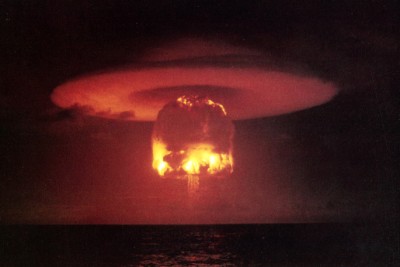International Day Against Nuclear Tests: Pressure on Key States Grows
The International Day Against Nuclear Testing is a global action established by the UN General Assembly in 2009. This day aims to draw attention to the "devastating and harmful effects" that nuclear testing has on people and the environment. The UN, represented by the Secretary-General, and international actors such as Austria's Foreign Minister Alexander Schallenberg are increasing pressure on so-called key states to finally ratify the Comprehensive Nuclear Test Ban Treaty (CTBT).
 Since 1945, more than 2,000 nuclear tests have inflicted terrifying suffering on people, poisoned the air we breathe, and ravaged landscapes around the world. / Picture: © Wikimedia Commons / United States Department of Energy, Public domain
Since 1945, more than 2,000 nuclear tests have inflicted terrifying suffering on people, poisoned the air we breathe, and ravaged landscapes around the world. / Picture: © Wikimedia Commons / United States Department of Energy, Public domain
The date was proposed by Kazakhstan and marks both the closure of the former Soviet Semipalatinsk test site in 1991 and the date of the first Soviet nuclear test there in 1949. Since the first nuclear test in 1945, more than 2,000 tests have taken place around the world, causing irreversible damage to the environment and health problems for people.
A treaty, but no implementation
Although the CTBT was released for signature in 1996 and created a global norm against nuclear testing, the treaty has not yet entered into force. Ratifications from eight key states are still needed for entry into force: China, Egypt, India, Iran, Israel, North Korea, Pakistan, and the United States.
"At a time when nearly 13,000 nuclear weapons are stockpiled around the world, this is a sure recipe for the extinction of humanity," the United Nations Secretary-General warns in his message for the worthy day.
Austria calls for swift steps toward nuclear disarmament
Austria, a State Party since 1997 and a fierce advocate of nuclear disarmament is increasing pressure on key states. "We need the nuclear test ban treaty more urgently than ever," said Foreign Minister Alexander Schallenberg. "Geopolitical tensions show the urgent need for sustained progress on nuclear disarmament," he adds.
Time is of the essence
The global community is speaking with one voice to break the destructive legacy of nuclear testing. "Especially now, when the threat of nuclear conflict is higher than ever, we need to put the humanitarian impact of potential nuclear weapons use at the center of the discussion," Schallenberg stresses.
While the world recognizes the devastating consequences of nuclear tests, the legal mechanism to ban them remains incomplete. The urgency for ratification of the Nuclear Test Ban Treaty is growing by the day. On behalf of all victims of nuclear testing, an appeal is being made by the head of the CTBTO, Rob Floyd, to key states: "Let's put a permanent end to nuclear testing." For the sake of global security and future generations, we can only hope that this appeal does not go unheard.



